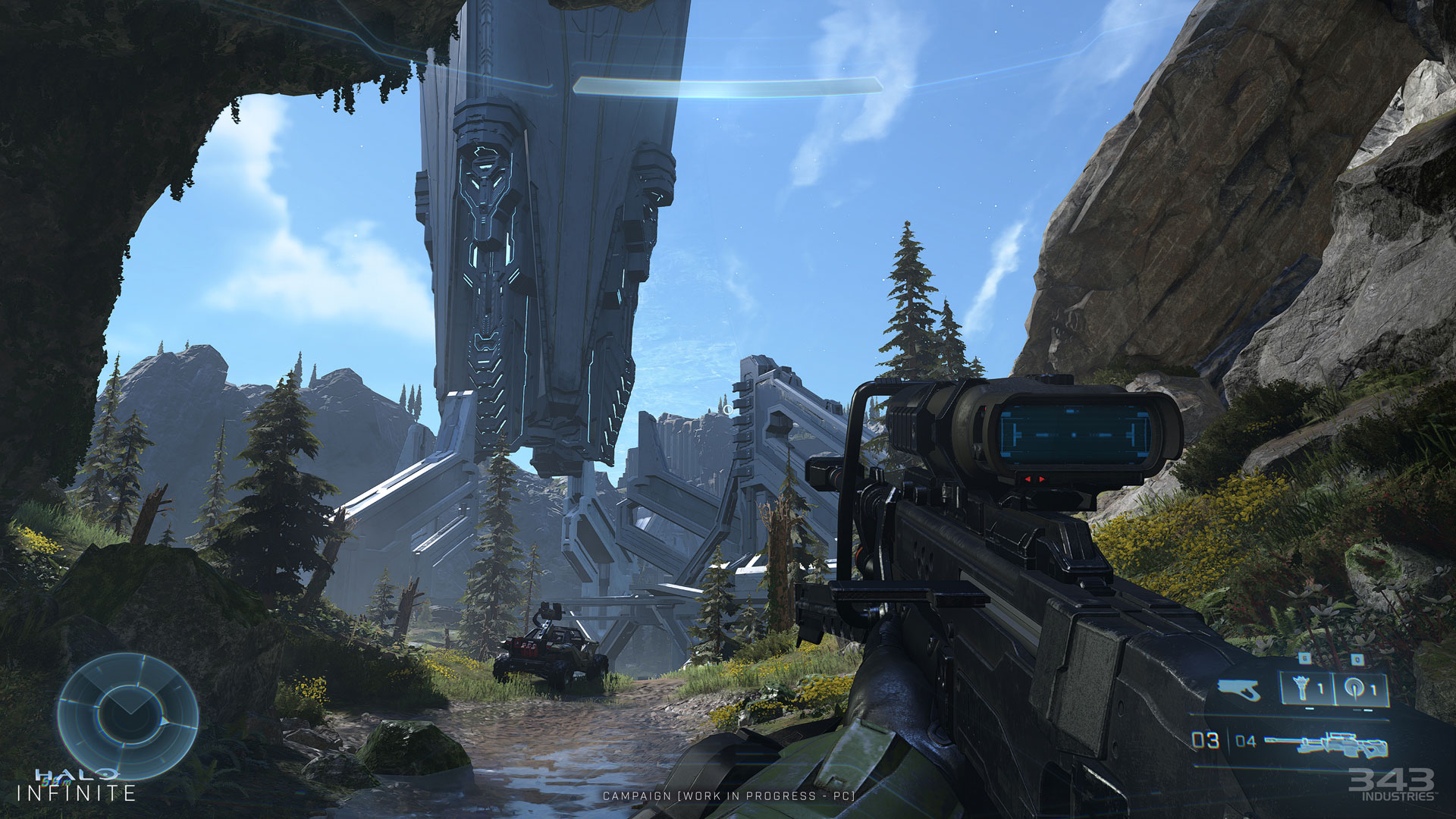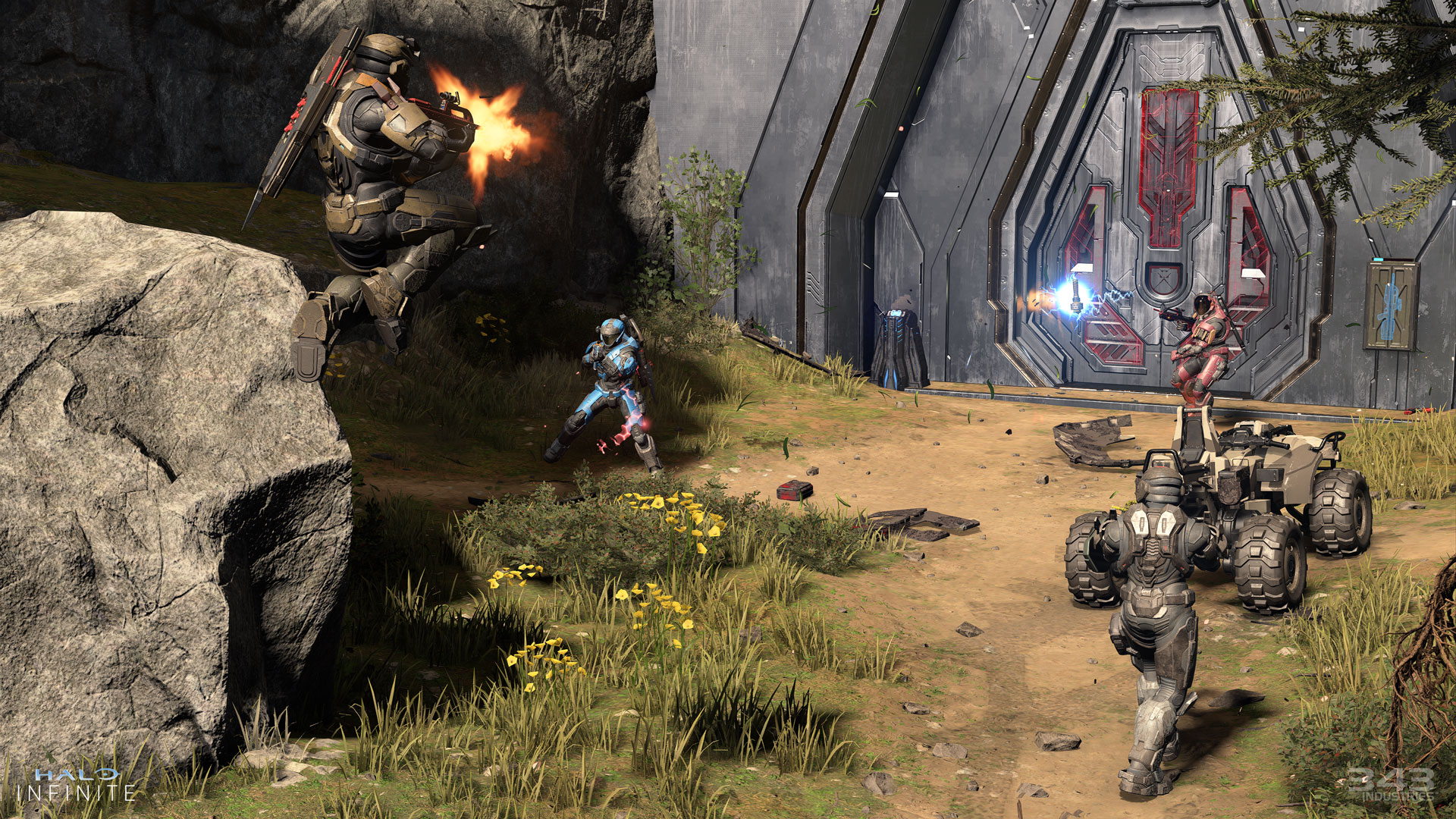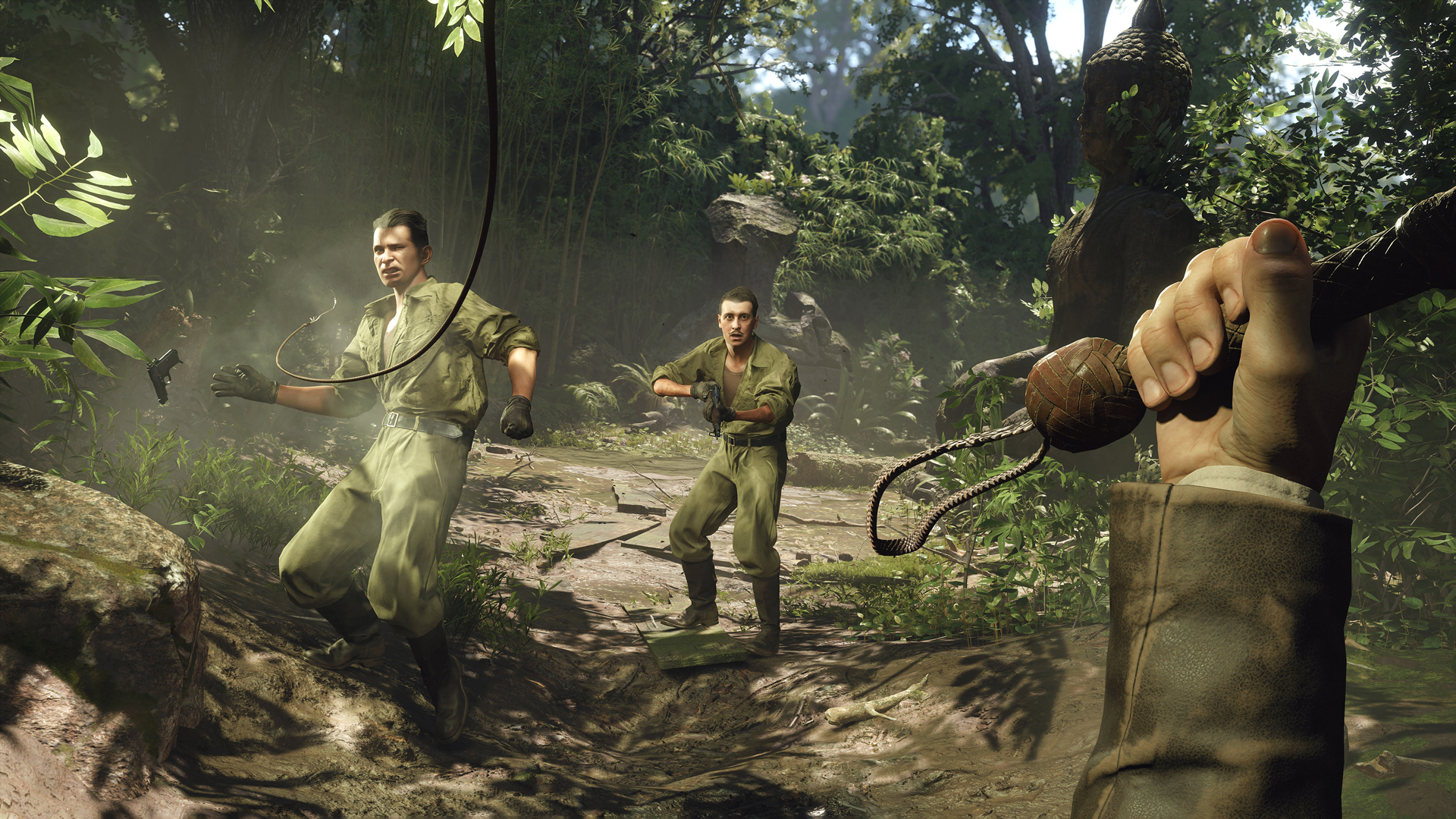Xbox is expanding its multiplatform strategy, and it should have arrived soon enough to save Halo Infinite

Microsoft Gaming is expanding further beyond the borders of the Xbox ecosystem than ever before. By the time we begin counting down the days to the 2024 Xbox Summer Showcase in June, four of the best Xbox Series X games will have renounced their exclusivity in search of new audiences – Hi-Fi Rush, Sea of Thieves, Grounded and Pentiment will be available for purchase and play on PS5, with the latter two titles also landing on PS4 and Switch. I can't say that I'm all that surprised.
Xbox has pursued a multiplatform strategy for some time now, and further expansion always felt like an inevitability. It's been a decade since Microsoft acquired Mojang Studios, and pledged that Minecraft would retain its multiplatform status – something which remained in place for the wide releases of Minecraft Dungeons and Minecraft Legends. Xbox Game Studios PC games started circumventing the Xbox ecosystem to land on Steam in 2019, while Psychonauts 2 and Wasteland 3 arrived on other platforms even after Double Fine and inXile were brought into the first-party fold. And then there's the Call of Duty of it all, which effectively has court-mandated multiplatform protections in place following the completion of the Activision Blizzard acquisition.
- Pentiment [PS5, PS4, NS] – Feb 22
- Hi-Fi Rush [PS5] – March 19
- Grounded [PS5, PS4, NS] – April 16
- Sea of Thieves [PS5] – April 30
With that all said, there is something about this new strategy that feels different. More deliberate, perhaps, with greater potential for expansion and experimentation from the development teams operating under the Xbox Game Studios label. When Microsoft Gaming CEO Phil Spencer announced plans to bring four Xbox games to PS5 and Switch outside of any existing acquisition cycle, he cited a desire to leverage the install bases of rival platforms "to help grow" certain first-party franchises, and create opportunities to "invest in sequels" and other creative opportunities across the portfolio.
It appears to be a shrewd strategy. Nintendo has shifted 132 million Switch units over the system's lifetime, making it the largest of the three primary console platforms. Sony says that the PS5 has surpassed 50 million consoles sold in little over three years, while the Xbox Series X and Series S, comparatively, have secured an estimated 25 million sales over the same period. Is Xbox's current install base – combined with players strewn across PC, Game Pass, and Cloud Gaming – large enough to ensure the long-term survival of live service experiences like Grounded and Sea of Thieves?
Something has to change

Hidden within Spencer's statement is an inference that it may not be enough, particularly when we consider the rising costs of development and the complexities inherent with managing large playerbases. Grounded and Sea of Thieves were selected for this initiative, in part, because of Microsoft's desire to continue expanding these community-driven platforms, even as the company acknowledges that the games have each "reached their full potential on Xbox and PC." Spencer continues: "Part of having the ability to continue to invest is that the businesses behind those franchises continue."
That's an inherently scary statement. It's been little over a month since Microsoft laid off 1900 staff from its video game division, and canceled a survival game that Blizzard had reportedly been developing for six years, following the 68.7 billion dollar acquisition of Activision. PlayStation Studios recently made similar cuts, shuttering London Studio (who was working on a live-service PS5 game of its own) while reducing headcount at Sony's most successful studios – Guerrilla (Horizon), Insomniac (Spider-Man), and Naughty Dog (The Last of Us). It's estimated that tens of thousands of developers lost their jobs last year, and that 2024 is on track to surpass those numbers. It's all contributing to this growing sense that video game production is unsustainable in its current form, and that the industry itself is on the verge of a crash the likes of which haven't been seen since 1983.
If games like Sea of Thieves wading into uncharted territories means that Rare is afforded an opportunity to build on strong foundations – expanding its universe and the activities within it to better support an absolutely wonderful community of players – then I'm all for it, particularly as more resources shift internally towards new projects like Everwild. We're in a tumultuous landscape, and honestly, I'm happy to celebrate Xbox exclusives arriving on other platforms if it means that Xbox Game Studios gets to keep on creating and Xbox IP is able to get a new lease on life. I only wish this strategy had arrived in time to save Halo Infinite.
Weekly digests, tales from the communities you love, and more

"I think there is an interesting story for us of introducing Xbox franchises to players on other platforms to get them more interested in Xbox"
Phil Spencer, Microsoft Gaming CEO
In the same month that Microsoft announced an estimated 9% reduction in the headcount of its gaming division, one of its most successful and important subsidiaries announced a change of its own. 343 Industries confirmed that it was ceasing the seasonal content model for Halo Infinite, drastically reducing the update cadence of its free-to-play FPS, as the studio begins "accelerating towards the future" and investing in "brand new projects." I can't help but feel as if this is the next stage of undeserved end for Halo Infinite – a slow death that started in earnest after the game launched as an incomplete package, and continued as 343 itself suffered layoffs and endured a dismantling of its senior leadership in 2023.
It's weird to think that it was a little over three years ago that former 343 studio head Chris Lee told me that he expected Halo Infinite to last a decade. That the campaign would continue the "Master Chief's saga for years to come" as the open world of Zeta Halo expanded to accommodate new stories; ultimately though, no expansions were ever formally revealed to the public, and none are expected to come now. A disappointing end to what I called a smart "foundation for future expansion" in my Halo Infinite review. Lee continued: "We want Halo Infinite to be a platform that grows over time [...] Creating this game is the start for the next ten years, and we'll be continuing to build that platform out as time goes on."
I'm not going to lie: I find it highly unlikely that a Halo campaign will ever land on a PlayStation platform; Master Chief is the closest thing Xbox has to a mascot, and SIE has never quite been able to crack the FPS market (it's been over a decade since Killzone last reared its armored head, and even longer since attempts were made with the likes of Resistance, SOCOM U.S. Navy SEALs, MAG, Haze, Warhawk, and a smattering of other experiments). Even as Microsoft looks beyond the potential of first-party exclusives, there's still a 'system seller' quality to a new story starring Chief and Cortana. Then again, for some strange reason, I have less reservations about a Halo multiplayer experience one day making the jump – and it should have been Infinite.
Finish the fight

There's plenty of reasons to own an Xbox Series X in 2024. Don't take my word for it, here's six Xbox exclusives you need to have on your radar this year.
The free-to-play shooter was always primed to introduce different audiences to the raucous energy of Halo, particularly as it was both partitioned off from the campaign and released simultaneously on PC – a first for the long-running series. 343 may have endured a rocky start with its nascent live-service experience, but Halo Infinite multiplayer has blossomed into this pretty awesome thing over the last two years. The quality of the seasonal content and battle pass rewards has improved massively, new game modes and Forge features empowered the community, and a smattering of quality-of-life sets only helped to breathe new life into an exceptionally solid shooter whose biggest mistake was stumbling out of the gate in a highly competitive live service arena.
I can't help but feel as if Halo Infinite (multiplayer) should have been lining up alongside Grounded and Sea of Thieves on the PS5 store, and that an injection of players eager to finally see what all the fuss is about with this franchise could have ensured its deserved long-term viability. Perhaps some of you will think that Halo on PlayStation in any capacity would be sacrilege, but I keep coming back to this line from Spencer's statement of intent around this new initiative: "Looking forward, I think there is an interesting story for us of introducing Xbox franchises to players on other platforms to get them more interested in Xbox. We think there's good brand value for Xbox there."

It's not impossible to imagine a world where PS5 owners inhabiting the Halo Infinite servers alongside PC and Xbox owners becomes enough to justify further investment in something that was, by 343's own admission, designed to carry the franchise forward for a decade. Would Halo's arrival on PlayStation platforms have been seen by some as a ringing of the death knell for the Xbox brand? Perhaps; in fact, given the furore that was generated as unsubstantiated rumors suggested Starfield and Indiana Jones and the Great Circle were making the jump, it certainly would have been.
Then again, could Halo Infinite landing on PS5 have introduced an entirely new generation to the joys of a truly inimitable FPS? Not only ensuring the long-term health of Infinite, justifying investment in multiplayer advancements and even DLC on the campaign side, but pushing those players towards Xbox Series X or Series S hardware to sample the rest of the franchise through Xbox Game Pass? I guess that now we'll never know.
Check out the list of upcoming Xbox Series X games for the release dates of key Xbox exclusives like Hellblade 2 and Stalker 2.

Josh West is the Editor-in-Chief of GamesRadar+. He has over 15 years experience in online and print journalism, and holds a BA (Hons) in Journalism and Feature Writing. Prior to starting his current position, Josh has served as GR+'s Features Editor and Deputy Editor of games™ magazine, and has freelanced for numerous publications including 3D Artist, Edge magazine, iCreate, Metal Hammer, Play, Retro Gamer, and SFX. Additionally, he has appeared on the BBC and ITV to provide expert comment, written for Scholastic books, edited a book for Hachette, and worked as the Assistant Producer of the Future Games Show. In his spare time, Josh likes to play bass guitar and video games. Years ago, he was in a few movies and TV shows that you've definitely seen but will never be able to spot him in.


